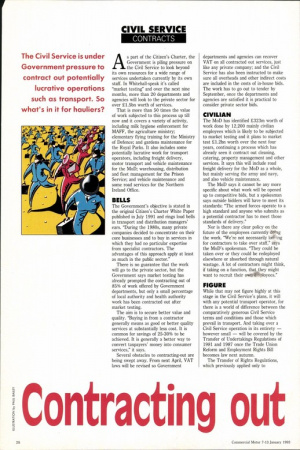Contracting out The Civil Service is under Government pressure to
Page 30

Page 31

If you've noticed an error in this article please click here to report it so we can fix it.
contract out potentially lucrative operations such as transport. So what's in it for hauliers? As part of the Citizen's Charter, the Government is piling pressure on the Civil Service to look beyond its own resources for a wide range of services undertaken currently by its own staff. In Whitehall-speak it's called "market testing" and over the next nine months, more than 20 departments and agencies will look to the private sector for over £1.5bn worth of services.
That is more than 50 times the value of work subjected to this process up till now and it covers a variety of activity, including milk hygiene enforcement for MAFF, the agriculture ministry; elementary flying training for the Ministry of Defence; and gardens maintenance for the Royal Parks. It also includes some potentially lucrative work for transport operators, including freight delivery, motor transport and vehicle maintenance for the MoD; warehousing, distribution and fleet management for the Prison Service; and vehicle maintenance and some road services for the Northern Ireland Office.
BELLS The Government's objective is stated in the original Citizen's Charter White Paper published in July 1991 and rings loud bells in transport and distribution managers' ears. "During the 1980s, many private companies decided to concentrate on their core businesses and to buy in services in which they had no particular expertise from specialist contractors. The advantages of this approach apply at least as much in the public sector."
There is no guarantee that the work will go to the private sector, but the Government says market testing has already prompted the contracting out of 85% of work offered by Government departments, but only a small percentage of local authority and health authority work has been contracted out after market testing.
The aim is to secure better value and quality. "Buying in from a contractor generally means as good or better quality services at substantially less cost. It is common for savings of 25-30% to be achieved. It is generally a better way to convert taxpayers' money into consumer services," it says.
Several obstacles to contracting-out are being swept away. From next April, VAT laws will be revised so Government departments and agencies can recover VAT on all contracted out services, just like any private company; and the Civil Service has also been instructed to make sure all overheads and other indirect costs are included in the costs of in-house bids. The work has to go out to tender by September, once the departments and agencies are satisfied it is practical to consider private sector bids.
CIVILIAN The MoD has identified £323m worth of work done by 12,200 mainly civilian employees which is likely to be subjected to market testing and it plans to market test £1.2bn worth over the next four years, continuing a process which has already seen it contract out cleaning, catering, property management and other services. It says this will include road freight delivery for the MoD as a whole, but mainly serving the army and navy, and also vehicle maintenance.
The MoD says it cannot be any more specific about what work will be opened up to competitive bids, but a spokesman says outside bidders will have to meet its standards: "The armed forces operate to a high standard and anyone who submits as a potential contractor has to meet those standards of delivery."
Nor is there any clear policy on the future of the employees currently tiehlg the work. "We're not necessarily long for contractors to take over staff," shys the MoD's spokesman. "They could be taken over or they could be redeployed elsewhere or absorbed through natural wastage. A lot of contractors might think, if taking on a function, tha they might want to recruit their o oyees."
FIGURE While that may not figure highly at this stage in the Civil Service's plans, it will with any potential transport operator, for there is a world of difference between the comparatively generous Civil Service terms and conditions and those which prevail in transport. And taking over a Civil Service operation in its entirety — however small — will be covered by the Transfer of Undertakings Regulations of 1981 and 1987 once the Trade Union Reform and Employment Rights Bill becomes law next autumn.
The Transfer of Rights Regulations, which previously applied only to commercial ventures, preserve the employees' continuity of employment and any rights contained in their contracts of employment, other than for occupational pensions.
Hays Distribution, which had some experience of taking over some work from the National Health Service, will try to avoid taking over complete undertakings. "This is a very big area which can be fraught with problems," says director Brian Man. "We've never done it and we don't think it's good practice. We tend to re-employ on our own terms and conditions."
That applies to any contract Hays takes over, but he says it would be particularly important in relation to Civil Service staff with rigid pay structures and gradings. "We couldn't take it and sit it in a business like ours. We could only go for Transfer of Undertakings if the conditions were acceptable to us and there would be difficulties in dealing with Government trades unions which are a different sort of animal for the unions in our business."
Man believes that the regulations would be a major obstacle to achieving the sorts of savings which transport companies can deliver. "The ability to enhance the client's bottom line is reduced if we inherit what they've got already. Indeed, some companies go out to tender for their distribution work because they are locked into excessive wage structures. The idea is to create something more efficient and the cleaner the piece of paper to start with, the better."
Two years ago Hays had high hopes that taking over NHS distribution and supplies procurement would be a major new growth area for its business. The NHS now does much of this centrally and Hays has pulled out, wiser and wary of what may emerge from the market testing initiative. Other companies' experiences have been more mixed, and have found that some Civil Service clients are keen to take advantages of the services they offer.
But in other cases they have given their clients such lessons in efficiency that they have improved their own operations and taken the work back from the private sector.
"What happens is that civil servants are starting thinking for themselves about what they can do to avoid privatisation. The process is making them look at ways of reducing their costs," says one senior distribution director.
CAUTIOUS Marr is cautious about the new opportunities: "Frankly, our business is more dedicated distribution and longer supply chain management and a lot of what appears to be being offered is in small bits. If the opportunity came to bring lots of bits together into one whole, it could be better, but our experience with the NHS left us a bit suspicious of how one gets involved and sets up distribution systems for Government departments."
He says that the NHS was not yet ready for what companies like Hays could do. "I sometimes got the idea that departments got the idea of contracting out bits without knowing what they wanted us to do. It almost needs people like us to start as consultants and find out what their needs are. The tender documents I've seen for the public sector have not been useful."
Man also suspects that some civil servants will have a vested interest in being deliberately vague so their own positions are protected from the influence of outside contractors. "Where people are told 'thou shalt have contract distribution' you find sometimes that things said on high are not necessarily brought in down the line. We've seen that with private companies, too, and we end up having to deal with reluctant providers of information."
by Alan Millar




























































